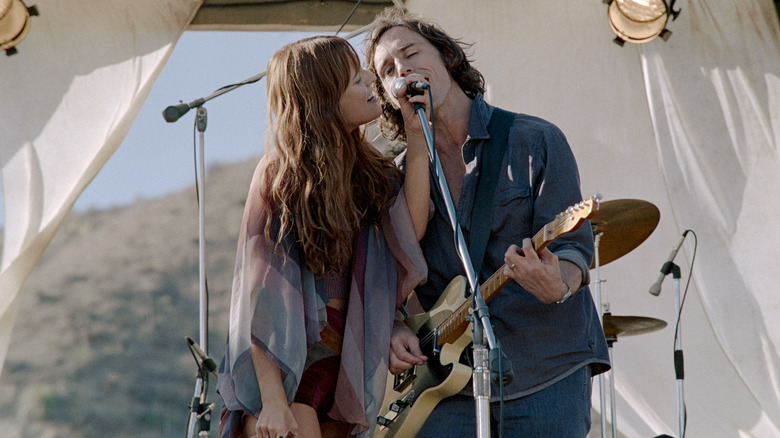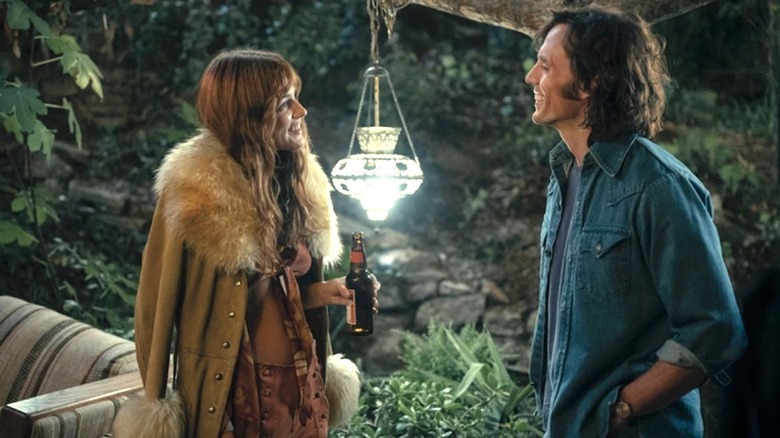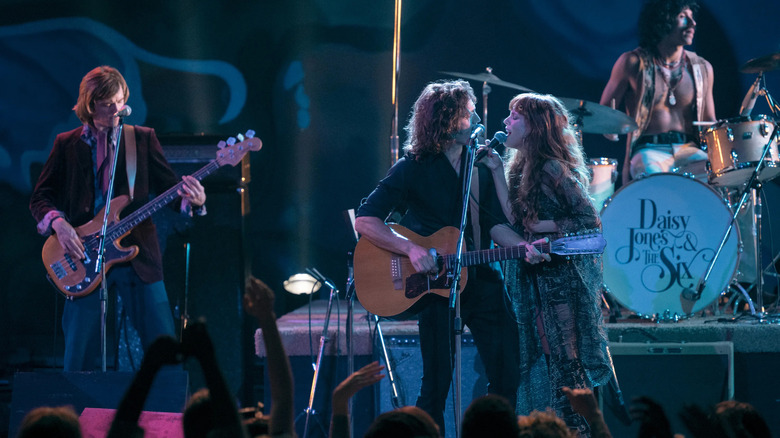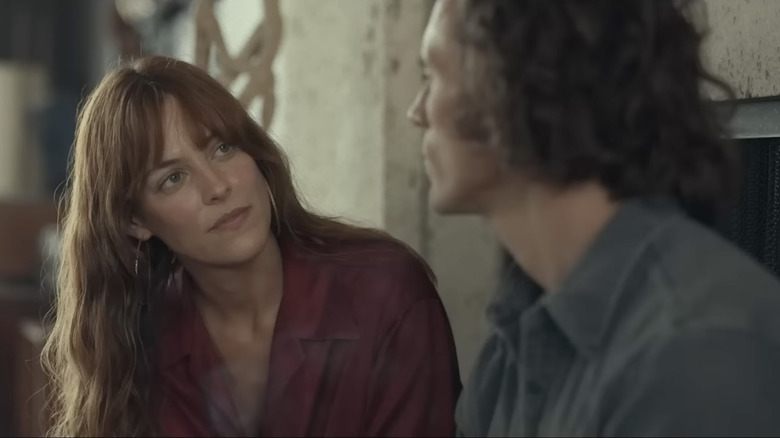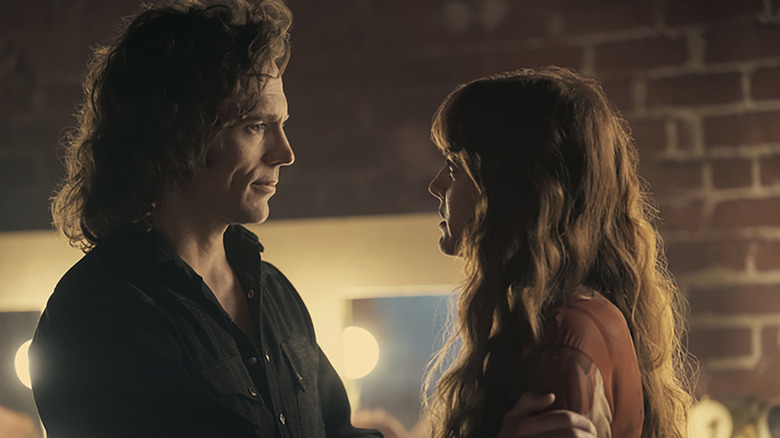How The First Song In Daisy Jones And The Six Foreshadows Everything That Comes After
There's no denying Daisy Jones and Billy Dunne were a match made in songwriting heaven. But past that, the central characters of "Daisy Jones & The Six" were always destined to clash to the point of ruin—and the proof is in the foreshadowing embedded in every line of the very first song Daisy and Billy (the enigmatic Riley Keough and Sam Claflin) collaborated on, "Honeycomb." The song is at once a look at a romance crumbling at the seams and an epitaph for a connection that, at the time of its writing and recording, had barely just begun.
"Honeycomb" was the first song the group worked on as a newly formed band called Daisy Jones & The Six, bringing together Daisy Jones the solo artist and The Six, a band of five formerly known as The Dunne Brothers. Billy brought his version of the song, one that he wrote long before Daisy came to record with The Six for the first time, to the studio that fateful day. But in a bizarre yet smart little betrayal by their producer Teddy Price, Daisy came prepared with her own take on the track that ended up being the final version.
We can make a good thing bad
Billy's original version was optimistic, maybe too much so. In the third episode of the series, he tells Daisy that his "Honeycomb" is about "starting a new life" and "redemption from letting people down." At that point in his life, that's what he so desperately wanted. He tells his scorned lover — clearly his wife Camila, played by Camila Morrone — in his original chorus, "I know we can get it all back."
But it's Daisy's influence on the song that switches things up, contorting it beautifully into a spotlight for guilt, as she claims the track to be, as well as stubbornness and spiteful optimism. "We can make a good thing bad" becomes the new chorus, a warning for what was to come for their artistic connection, as well as a reminder of Billy's fractured relationship with his wife. Guilt is at the heart of the demise of Daisy Jones & The Six, and its presence in their breakout hit track is apt as one of three main ways "Honeycomb" foreshadows the demise of Daisy and Billy's creative connection.
How did we get here?
Guilt is buried within the lyrical tweaks made by Daisy's revamp of the song, just as it lives within the trajectory of her bond with Billy. As their songwriting relationship progressed into something undeniably electric, so did their personal one. Things became romantic between them — both physically and emotionally — and it naturally did a number on Billy's psyche, especially after his original infidelities in his marriage. He worked to improve himself, and his attraction to Daisy didn't help when it came to living up to the expectations that not only his wife had for him, but that he had for himself after getting sober.
As their romance escalated throughout the band's rise to and through stardom, Billy was more willing, though not happy, to buck those expectations despite the guilt. But Daisy wasn't absolved of that guilt either. One of the most refreshing elements of the interpersonal relationships of this series is Daisy and Camila's undeniable respect and love for one another. Instead of pitting these two women against one another, the series makes it a point to position them, as Pink Floyd once put it, "two lost souls swimming in a fish bowl," and it seems they see much of themselves in one another. This connection left Daisy vulnerable to the same remorse as Billy, and that feeling is part of why Daisy Jones & The Six crumbled under the pressure despite their musical successes. They quite literally made a good thing bad by unnecessarily complicating it.
We used to be something to see
There is also a sense of stubbornness at play between both central characters, and in turn, the way they operate in the world that radiates from the song's foreboding lyrics. That includes how they move in relationships, creatively, and for their own well-being. In the studio—as evidenced by the recording of "Honeycomb," and, of course, its lyrics—both parties were adamant about their creative inputs to the point where they clashed hard before they were able to smooth things over. Both Daisy and Billy are strong personalities that live by an unyielding notion that their genius needs no one else to succeed, and the scene where they record the band's first hit single is a great example of that. If it weren't for Price's insistence on Daisy's version, it stands to reason that version may have never actually been recorded due to a tantrum from Billy.
But their stubbornness bleeds through into their romance as well. They held on so tightly to the crumbs of a connection they had, simply because of how alive it made them feel. Until meeting one another, Daisy hadn't experienced a kinetic magnetism like the one she felt toward Billy, and he was left grappling with the idea that that kind of bond was possible outside of his wife. It wasn't easy to navigate, but their dedication to their music always, somewhat shakily, steered the course. Like their magnum opus track states, they couldn't let it — each other, the band, the music—go for a long time and it continued to erode their working relationship, much like the romantic one at the center of "Honeycomb." They circle one another throughout the series, nearly hovering to just be in each other's orbits, not taking no for an answer when they should.
Look at us now
Ultimately, Daisy and Billy's stubbornness siphoned off into a spiteful optimism that pushed them into the band's final months and into their last show at Soldier Field. The pair knew they could fake being the perfect duo despite the nosedive their romance had taken once the band's demise was in full force, but their connection became undeniable and took over on stage. Daisy and Billy know this will be the end of the band as they know it, but they resign themselves to the fact that the wreckage is worth it, even when it puts their collective sobriety at risk. They didn't even get to revel in the spoils, because Billy ran back to his wife during Daisy's spirited "Honeycomb" encore. But for a few moments, their love was immortalized within the music. That is, until that spiteful optimism gave way to guilt again, the ouroboros of "Honeycomb." The song is a cyclical reminder of what could've been for the pair's attachment, both creatively and romantically.
It's almost eerie to think of how well Daisy and Billy predicted their love becoming something tainted and unmanageable. But at the same time, the musicians were pretty lost souls from the get-go. People who have had bad things happen to them tend to expect bad things to keep happening, and that is certainly a throughline of "Honeycomb." When they recorded it, they might not have realized they were begging each other to set them free within the song, something it would take years of heartache, heartbreak, struggle, and triumph for them to do for one another. "Honeycomb" was just the beginning for two souls musically destined to connect in a big way, but otherwise doomed to crash and burn.
"Daisy Jones & the Six" is available to stream now on Prime Video.
